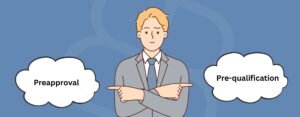How Far in Advance Should I Get Preapproved for a Mortgage?

Obtaining a mortgage can be a daunting task, especially if you aren’t sure about the process involved.
A mortgage is likely to be one of the biggest financial commitments you will make in your life, so ensuring you do it correctly will alleviate a lot of stress and anxiety.
Preapproval for a mortgage is exactly what it sounds like.
A mortgage company will give you an informal document called an Agreement in Principle (AIP) or Decision in Principle (DIP) that says that you can borrow money from them, subject to their criteria.
DIPs allow you to approach a property seller with a document that says you have the funds to make an offer on the property.
So, when should you get it and how do you go about getting a DIP?
This guide breaks down everything you need to know about getting a DIP and the steps you can take to make the process simpler.
If you’re short on time you can watch this video we produced:
- What's the Best Time to Get Preapproved on a Mortgage?
- Why is it Important to Get Preapproved?
- What is the Difference Between Preapproval and Pre-qualification?
- How Long Does Preapproval Take?
- How Long Does a Preapproval Last?
- What Documentation Will I Need for Preapproval?
- What Factors Affect Getting a Mortgage Preapproval?
- What Should I Do if I Can't Get Preapproval?
What’s the Best Time to Get Preapproved on a Mortgage?
This is dependent on your circumstances. Before you get a DIP, you should first speak to a mortgage broker who can take stock of your personal situation and prequalify you for a mortgage.
A broker will complete a detailed fact find which encompasses your finances, lifestyle and personal commitments.
After completing a fact find the broker can look at the mortgage products available to you and advise on a number of areas.
- They will tell you what documentation you will need to provide in order to get a mortgage.
- How much deposit will be required for a mortgage product.
- Which lender offers the best terms for your circumstances.
- Troubleshoot any problem areas with you to help you get the mortgage.
Once the broker has found a mortgage that meets your needs they will ask if you would like a DIP.
Depending on where you are in the house buying process this might be something you already need or will need imminently.
You might have already found a property that you want to make an offer on and that may well be the reason why you contacted the broker to get preapproved on the mortgage.
In other cases, you may not have found the property yet but have an idea of how much you can afford on a mortgage and want to get the DIP ready for your property search.
The great news is you can get a DIP with relative ease after a fact find has been completed – wherever you might be in the house search it is a good idea to speak to a broker as soon as possible.
Instead, you should consider a DIP as a reasonable indication that you can get a mortgage.
What Our Clients Have To Say
Why is it Important to Get Preapproved?
Firstly, you don’t necessarily need to have a DIP to obtain a mortgage. This is because some estate agents and sellers will accept offers without them. In theory you could make an offer on a property and then proceed to a full mortgage application without ever getting a DIP.
With that said, it is always advisable to get preapproved before you proceed to a full mortgage application for the following reasons;
- Your credit score might not be sufficient for the mortgage product you had in mind.
- Affordability for mortgage lenders varies widely and assuming you will be able to borrow the amount you need can leave you with a nasty surprise when it comes to application.
- Lenders have different criteria when it comes to property, so even if you’re able to borrow the money with your credit score and affordability calculation, you may find the property isn’t to the lender’s standards.
Let’s look at those three aspects a bit more closely.
Credit Score
When you’re preapproved for a mortgage, you will be credit checked. Most lenders use what’s known as a soft credit search which doesn’t leave a trace on your credit file.
In rare cases lenders use a hard credit search which will show on your credit report if any other lenders conduct searches.
When you make a full mortgage application it will almost always be a hard credit search.
This means if you forego the step of getting a DIP and you’re declined by a lender on an application due to your credit score, any subsequent lenders will see that you have been declined elsewhere.
Being declined for a mortgage can negatively impact your credit score as well further complicating getting a mortgage.
This is easily avoided by getting the DIP which will tell you whether your credit score is sufficient for that lender and in most cases, it doesn’t impact your credit score at all.
Preapproval and Affordability
A common misconception is that lenders will allow you to borrow a set multiple of your annual salary. For example, it is often cited that lenders will allow you to borrow 4.5 times your annual salary.
Lending criteria with affordability varies widely between lenders and some even allow you to borrow more than 4.5 times your salary.
Affordability is far more complex than just income multiples though and they take into account much more than your salary.
In the UK a large portion of the population rents their living space and car finance agreements are becoming very prevalent.
Both monthly rent and car finance payments (and other debt) are likely to reduce the amount you can borrow from a lender.
In short, affordability takes your outgoings and financial commitments into account alongside your income and calculations can be much lower than people expect.
Preapproval allows you to find a property that you can actually afford to buy rather than finding a property you think you can afford only to be disappointed when a lender gives you a lower affordability calculation.
Property Criteria
Your preferred lender will have a set of requirements for the property to be mortgageable. Normally this covers basic things like being of standard construction (brick) with a slate or tile roof.
A lenders’ criteria will also have other more detailed standards for a property.
Getting a DIP through a broker will mean that you have prequalified the lender with your desired property.
If you don’t have a broker arranging your DIP, it is possible you could get to mortgage application and find that your property doesn’t meet the standard set out by the lender causing an unnecessary decline (which can, as mentioned above, impact your credit score).
To summarise getting preapproved for a mortgage gives you a reasonable expectation that you won’t have nasty surprises when you’re ready to make your full mortgage application.
Our Mortgage Experts Can’t Wait to Help.
What is the Difference Between Preapproval and Pre-qualification?
Preapproval is a stage in the mortgage process where a lender will issue a document (DIP / AIP) that confirms they will lend you the money providing you give them the required evidence upon a full mortgage application.
Pre-qualification is the stage before getting a DIP. This is where a broker will look at your circumstances and explore your options for getting a mortgage.
Pre-qualification is equally important to a preapproval as once again it can help you navigate the mortgage process without nasty surprises.
For example, self-employed people will have their income calculated in different ways by different lenders.
Some take an average of your self-employed income over a number of years to calculate your affordability whereas others will only require your latest year.
Pre-qualification enables you to first know how a lender will calculate your affordability for the DIP and it will also help you gauge which documentation you will need as evidence for the lender.
In fact, for some people, pre-qualification can be the most vital step to take with a mortgage as there could be elements around borrowing that you haven’t considered, and a broker can help with.
How Long Does Preapproval Take?
Once the fact find has been completed by the broker, preapproval can be done in a relatively short timeframe. Most DIPs are issued through a lenders’ online portal with the DIP emailed for you to print (or by post in some cases).
Most DIP decisions are made instantly by the lender after completing the information required. In rare cases a decision might be referred if a lender wants further information.
A DIP can also be declined, which will normally be due to your credit score.
A broker will have already pre-qualified your affordability and a good broker won’t proceed to DIP if the affordability criteria isn’t met.
Before applying for a DIP your broker should tell you whether the lender uses a soft or hard credit check.
Remember you ideally want to avoid a hard credit check wherever possible at DIP stage as it can be problematic if you apply for a number of DIPs with hard credit checks, as it can negatively impact your credit score.
How Long Does a Preapproval Last?
It isn’t uncommon for financial situations to change during the mortgage process, so lenders operate different timeframes for how long they consider the DIP valid.
With some lenders a DIP is valid for a month and others are more generous, extending it to three months.
Your broker will advise how long your DIP is valid for.
An important point here is that even if the DIP is valid, it is NOT a guarantee that the lender will actually lend you the money.
You will still need to go through a full mortgage application and a final lending decision will be made at that point.
What Documentation Will I Need for Pre-approval?
In most cases you won’t need documentation to get a DIP. In rare cases a lender may require more information and can request documents to support you getting a DIP.
Normally though your broker will have completed the fact find process and use the information gathered from that to complete the DIP.
However, responsible brokers will request documentation for their own compliance checks prior to applying for a DIP to verify the information being submitted to the lender.
Technically a credit search could be considered evidence/documentation, but this is all done online by the lender behind the scenes, and you won’t need to provide this yourself.
What Factors Affect Getting a Mortgage Preapproval?
There are a plethora of factors that could affect you getting a mortgage approval and it is fair to say that getting a DIP could be tricky for any number of reasons.
However, most commonly there are 4 things that affect getting a DIP.
- Debt – This is probably the single most common pitfall with both DIPs and mortgage applications. Lenders will look at your monthly outgoings such as car finance, credit cards, personal loans and overdrafts, with some lenders being so cautious that if you use an overdraft regularly it will impact your chances of getting a mortgage.
- Existing Rent – Perhaps a bit counterintuitive as you might think that if you get a mortgage, you will no longer be paying rent. But a lender will look at how much rent you pay currently and calculate affordability in most instances with this considered.
- Credit History – Adverse credit like bankruptcy, missed payments, defaults and CCJs will all be evaluated by a lender when it comes to a DIP. Some lenders have generous credit profile requirements while others are extremely strict. Your broker will advise which lender is best for your credit profile before completing a DIP.
- Income Requirements – Lenders calculate your income in different ways to determine your mortgage affordability and again some are more flexible than others. It is important that you know how a lender will calculate your income before applying for a DIP to get the desired amount you wish to borrow.
Sometimes unforeseen problems pop up such as inaccuracies on your credit file. These should be dealt with by contacting the relevant credit agency and disputing any errors that you find.
Other than that, if you’re using a broker, you shouldn’t have any problems at the DIP stage as they will have pre-qualified you before proceeding further.
Contact Boon Brokers for fee-free help and advice today!
What Should I Do if I Can’t Get Preapproval?
If you can’t get preapproved for a mortgage it will likely mean either looking at other lenders or re-evaluating your capacity to borrow money.
You might need to save more for a deposit or look at your income and expenditure to see if there are any areas you can improve. It can sometimes be a good idea to pay off existing debt such as credit cards or ensure you aren’t using your overdraft regularly.
Boon Brokers is a UK whole of market mortgage, insurance and equity release broker. If you want to get preapproval for a mortgage or have questions about how to improve the likelihood of being preapproved, contact us for FREE no obligation advice today.
Need Mortgage Advice?
Submit an Enquiry
Gerard BoonB.A. (Hons), CeMAP, CeRER
Gerard is a co-founder and partner of Boon Brokers. Having studied many areas of financial services at the University of Leeds, and following completion of his CeMAP and CeRER qualifications, Gerard has acquired a vast knowledge of the mortgage, insurance and equity release industry.Related Articles
- Mortgage Broker Fees
- How Much Does The Average Mortgage Cost
- How To Get A Mortgage With A New Job
- Mortgage Affordability Calculator
- Getting A Joint Mortgage With Your Parents
- What Is An Offset Mortgage?
- Can I Overpay My Mortgage?
- What Is A Mortgage Illustration?
- The Mortgage Underwriting Process
- How Does Being Self Employed Affect A Joint Mortgage?
- What Is A Tenants In Common Agreement?
- Reduce Mortgage Term Or Overpay









